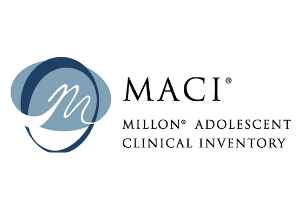Author:
Theodore Millon, PhD, DSc, Carrie Millon, PhD, Roger Davis, PhD, Seth Grossman, PsyD
Overview:
Designed specifically for teenagers, the MACI helps identify early signs of Axis I and Axis II disorders in adolescents
Age Range:
13–19
Administration:
Paper-and-pencil, CD, computer, or online administration
Scoring Option:
Q-global™ web based, Q Local™ Software, Manual Scoring, or Mail-in Scoring
Reading Level:
6th Grade
Completion Time:
20-25 minutes (160 true/false items)
Report Options:
Interpretive and Profile Reports
Publication Date:
1993
New Grossman Facet Scales zero in on critical issues.
Unlike many other instruments developed for adults and adapted for adolescents, the MACI assessment was specifically created to address the unique concerns, pressures and situations facing teens. This dedicated tool, recently enhanced by the addition of Grossman Facet Scales, helps assess personality patterns as well as self-reported concerns and clinical symptoms. Brief and easy to administer, the MACI can assist practitioners in constructing treatment plans customized to individual needs and help them guide troubled youth toward healthier, more authentic lives.

How to Use This Test
The MACI is well-suited for use in all teen treatment settings, including outpatient, inpatient, day treatment and residential treatment programs. Psychologists, psychiatrists, school psychologists, juvenile justice professionals and other mental health professionals find this versatile instrument essential in helping to:
- Conduct detailed evaluations to confirm diagnostic hypotheses
- Create individualized treatment plans
- Measure progress before, during and after treatment
Key Features
- To help you formulate more precise treatment plans, the new Grossman Facet Scales identify personality processes (e.g., self-image, mood temperament) that underlie overall scale elevations on the Personality Pattern scales. Each personality scale now has three facet scales, for which results are presented in the automated reports.
- Using an age-appropriate format, the MACI helps measure a number of factors closely associated with adolescents, including Sexual Discomfort, Substance Abuse Proneness, Suicidal Tendency and Eating Dysfunctions.
- Taking 30 minutes or less to complete, the MACI is designed to obtain the maximum amount of information with a minimal amount of the test-taker’s effort–a feature that mental health professionals have found especially helpful in working with adolescents.
Scales
The MACI contains 27 scales in three clinically relevant categories along with modifying indices that help identify test-taking attitudes as well as confused or random responding.
Modifying Indices
Scale X – Disclosure
Scale Y – Desirability
Scale Z – Debasement
Personality Patterns
1 – Introversive
2A – Inhibited
2B – Doleful
3 – Submissive
4 – Dramatizing
5 – Egotistic
6A – Unruly
6B – Forceful
7 – Conforming
8A – Oppositional
8B – Self-Demeaning
9 – Borderline Tendency
Expressed Concerns
A – Identity Diffusion
B – Self-Devaluation
C – Body Disapproval
D – Sexual Discomfort
E – Peer Insecurity
F – Social Insensitivity
G – Family Discord
H – Childhood Abuse
Clinical Syndromes
AA – Eating Dysfunctions
BB – Substance Abuse Proneness
CC – Delinquent Predisposition
DD – Impulsive Propensity
EE – Anxious Feelings
FF – Depressive Affect
GG – Suicidal Tendency
Personality Patterns and Corresponding Grossman Facet Scales
Scale 1 Introversive
Scale 1.1 Expressively Impassive
Scale 1.2 Temperamentally Apathetic
Scale 1.3 Interpersonally Unengaged
Scale 2A Inhibited
Scale 2A.1 Expressively Fretful
Scale 2A.2 Interpersonally Aversive
Scale 2A.3 Alienated Self-Image
Scale 2B Doleful
Scale 2B.1 Temperamentally Woeful
Scale 2B.2 Expressively Disconsolate
Scale 2B.3 Cognitively Pessimistic
Scale 3 Submissive
Scale 3.1 Interpersonally Docile
Scale 3.2 Temperamentally Pacific
Scale 3.3 Expressively Incompetent
Scale 4 Dramatizing
Scale 4.1 Interpersonally Attention-Seeking
Scale 4.2 Gregarious Self-Image
Scale 4.3 Cognitively Flighty
Scale 5 Egotistic
Scale 5.1 Admirable Self-Image
Scale 5.2 Cognitively Expansive
Scale 5.3 Interpersonally Exploitive
Scale 6A Unruly
Scale 6A.1 Expressively Impulsive
Scale 6A.2 Acting-Out Mechanism
Scale 6A.3 Interpersonally Irresponsible
Scale 6B Forceful
Scale 6B.1 Interpersonally Abrasive
Scale 6B.2 Expressively Precipitate
Scale 6B.3 Isolation Mechanism
Scale 7 Conforming
Scale 7.1 Expressively Disciplined
Scale 7.2 Interpersonally Respectful
Scale 7.3 Conscientious Self-Image
Scale 8A Oppositional
Scale 8A.1 Discontented Self-Image
Scale 8A.2 Expressively Resentful
Scale 8A.3 Interpersonally Contrary
Scale 8B Self-Demeaning
Scale 8B.1 Cognitively Diffident
Scale 8B.2 Undeserving Self-Image
Scale 8B.3 Temperamentally Dysphoric
Scale 9 Borderline Tendency
Scale 9.1 Temperamentally Labile
Scale 9.2 Cognitively Capricious
Scale 9.3 Uncertain Self-Image
Psychometric Information
The normative population of the MACI consists exclusively of clinical adolescent patients, offering relevant comparisons. The sample includes 579 adolescents from outpatient, inpatient and residential treatment programs in 28 states and Canada. The delineation of four distinct norm groups further enhances the test’s usefulness:
- Males 13–15 years old
- Females 13–15 years old
- Males 16–19 years old
- Females 16–19 years old
Report Options
Profile Report
Provides base rate scores for all 27 scales and three modifying indices in an easy-to-read graph. This convenient report can help quickly identify clients who may require more intensive evaluation.
View a sample MACI Profile Report
Interpretive Report
Based on individual test results, this report provides an in-depth analysis that brings critical concerns to light and includes treatment strategies specifically developed to address teen-related issues. In addition, diagnostic recommendations are aligned with DSM-IV classifications, helping to ensure the test’s clinical utility and facilitate communication among practitioners. The report also includes a profile of base rate scores for the scales.
View a sample MACI Interpretive Report
Scoring and/or Reporting Options
Q-global™ Web-based Administration, Scoring, and Reporting – Enables you to quickly assess and efficiently organize examinee information, generate scores, and produce accurate comprehensive reports all via the Web.
Q Local™ Scoring and Reporting Desktop Software – Enables you to score assessments, report results, and store and export data on your computer.
Mail-in Scoring Service – Specially designed answer sheets are mailed to Pearson for processing within 24–48 hours of receipt; results returned via regular mail.
-
Free Online Introductory Training Programs
This independent study training program provides an overview of the MACI and M-PACI. Five lectures presented by co-author Dr. Seth Grossman provide an introduction to the MACI, its features, scales, and interpretation guidance.
Earn up to 3 APA CE credits! (Nominal fee applies)
Modules contain documents under the “Attachments” tab that can be used to obtain CE credit. To apply for CE credits, scan and email the completed learning assessments and course evaluation form to CEAdmin@Pearson.com.
Getting Started with the Q-global Training Series
View these brief training modules about Q-global:
Pre-recorded Webinars
-
Overview of the Millon Adolescent Clinical Inventory (MACI)
Presenter: Gloria Maccow, PhD and Robert Tringone, PhD
The Millon Adolescent Clinical Inventory (MACI) was specifically developed to address the unique concerns, pressures and situations facing teenagers. This brief and reliable inventory can help provide early intervention on difficulties that may prevent teens from thriving. Composed of only 160 true/false items and featuring 27 clinically relevant scales, the MACI is designed to obtain the maximum amount of information with a minimal amount of test-taker’s effort. This webinar will describe how the MACI can be used in all teen treatment settings to help you assess personality patterns as well as self-reported concerns and clinical symptoms of adolescents, ages 13 through 19 years. The presenter will describe how the MACI is used as part of a comprehensive evaluation to confirm diagnostic hypotheses, and construct treatment plans customized to individual needs.
Date: Oct 11, 2017
 PDF: Overview of the Millon Adolescent Clinical Inventory (MACI)
PDF: Overview of the Millon Adolescent Clinical Inventory (MACI)
 Video: Overview of the Millon Adolescent Clinical Inventory (MACI)
Video: Overview of the Millon Adolescent Clinical Inventory (MACI)
-
Overview of the Millon Adolescent Clinical Inventory (MACI)
Presenter: Gloria Maccow, PhD and Robert Tringone, PhD
The Millon Adolescent Clinical Inventory (MACI) was specifically developed to address the unique concerns, pressures and situations facing teenagers. This brief and reliable inventory can help provide early intervention on difficulties that may prevent teens from thriving. Composed of only 160 true/false items and featuring 27 clinically relevant scales, the MACI is designed to obtain the maximum amount of information with a minimal amount of test-taker’s effort.
This webinar will describe how the MACI can be used in all teen treatment settings to help you assess personality patterns as well as self-reported concerns and clinical symptoms of adolescents, ages 13 through 19 years. The presenter will describe how the MACI is used as part of a comprehensive evaluation to confirm diagnostic hypotheses, and construct treatment plans customized to individual needs.
Date: Jun 21, 2017
 PDF: Overview of the Millon Adolescent Clinical Inventory (MACI)
PDF: Overview of the Millon Adolescent Clinical Inventory (MACI)
 Video: Overview of the Millon Adolescent Clinical Inventory (MACI)
Video: Overview of the Millon Adolescent Clinical Inventory (MACI)
-
Overview of the Millon Adolescent Clinical Inventory (MACI)
Presenter: Gloria Maccow, PhD and Robert Tringone, Ph.D.
The Millon Adolescent Clinical Inventory (MACI) was specifically developed to address the unique concerns, pressures and situations facing teenagers. This brief and reliable inventory can help provide early intervention on difficulties that may prevent teens from thriving. Composed of only 160 true/false items and featuring 27 clinically relevant scales, the MACI is designed to obtain the maximum amount of information with a minimal amount of test-taker’s effort. This webinar will describe how the MACI can be used in all teen treatment settings to help you assess personality patterns as well as self-reported concerns and clinical symptoms of adolescents, ages 13 through 19 years. The presenter will describe how the MACI is used as part of a comprehensive evaluation to confirm diagnostic hypotheses, and construct treatment plans customized to individual needs.
Date: Apr 13, 2017
 PDF: Overview of the Millon Adolescent Clinical Inventory (MACI)
PDF: Overview of the Millon Adolescent Clinical Inventory (MACI)
 Video: Overview of the Millon Adolescent Clinical Inventory (MACI)
Video: Overview of the Millon Adolescent Clinical Inventory (MACI)
-
Overview of the Millon Adolescent Clinical Inventory (MACI)
Presenter: Gloria Maccow, PhD
The Millon Adolescent Clinical Inventory (MACI) was specifically developed to address the unique concerns, pressures and situations facing teenagers. This brief and reliable inventory can help provide early intervention on difficulties that may prevent teens from thriving. Composed of only 160 true/false items and featuring 27 clinically relevant scales, the MACI is designed to obtain the maximum amount of information with a minimal amount of test-taker’s effort.
This webinar will describe how the MACI can be used in all teen treatment settings to help you assess personality patterns as well as self-reported concerns and clinical symptoms of adolescents, ages 13 through 19 years. The presenter will describe how the MACI is used as part of a comprehensive evaluation to confirm diagnostic hypotheses, and construct treatment plans customized to individual needs.
Date: Feb 07, 2017
 Video: Overview of the Millon Adolescent Clinical Inventory (MACI)
Video: Overview of the Millon Adolescent Clinical Inventory (MACI)
Questions
Frequently asked questions follow. Click on a question to see the response.
Test Content
Administration
Scoring
-
Will recording the wrong sex make a difference on the profile?
-
Will recording the wrong birth date make a difference on the profile?
-
Can the MACI test be invalid even if there are less than 10 omissions?
-
Why is the MACI test invalid if the scores on Scales 1-8B are all less than 60 BR?
-
What are base rate scores?
-
What is the purpose of the Grossman facet scales?
-
How are Grossman facet scale results reported?









